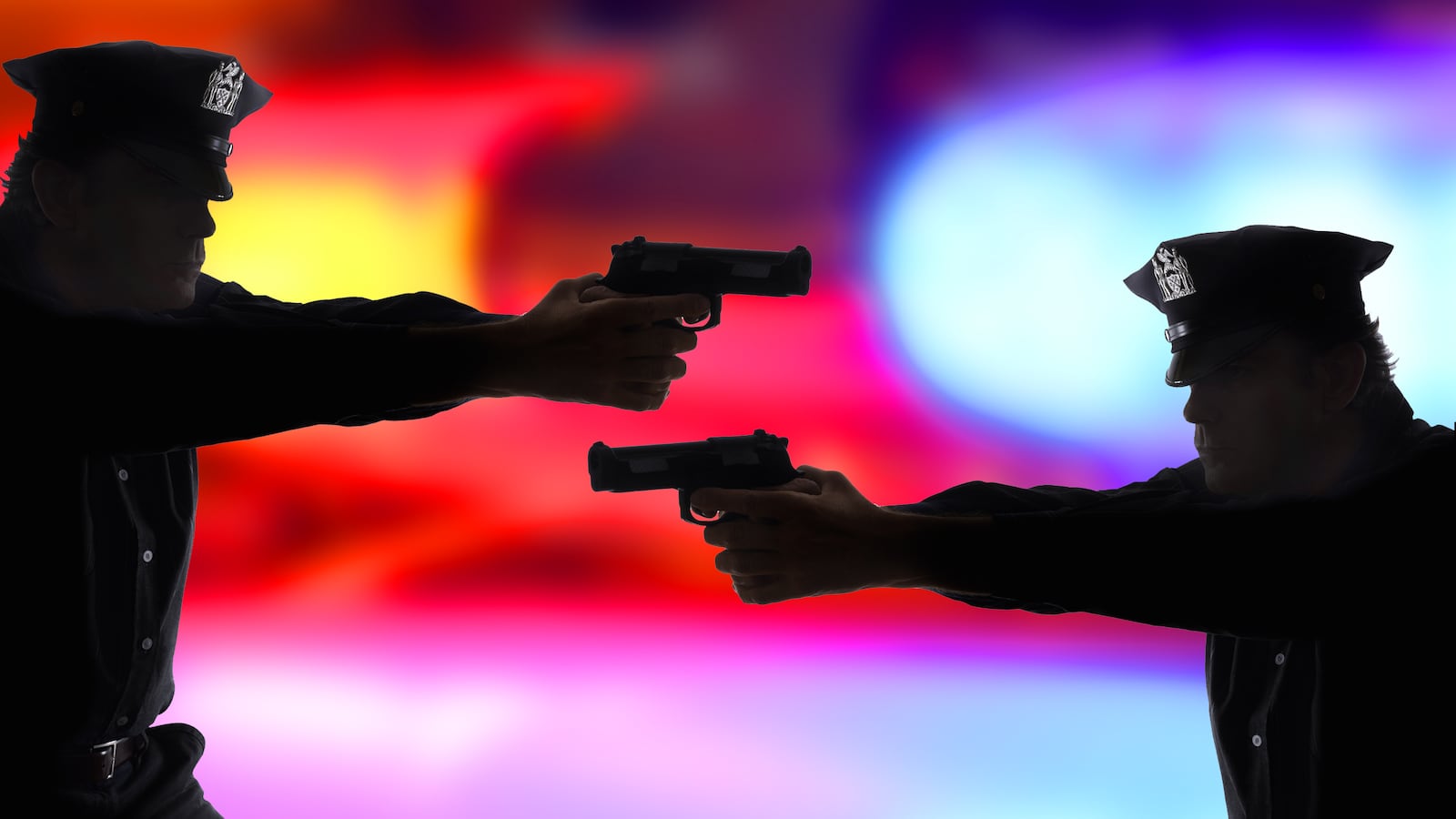The number of signs that Albuquerque Police Lieutenant Greg Brachle ignored or didn’t see before putting nine .45-caliber bullets into his fellow officer’s body are simply staggering.
There was the fact that Brachle knew Detective Jacob Grant was involved in a drug buy last January, a sting the superior officer walked up on while Grant sat in an undercover police car. There were Grant’s clothes, an outfit specially worn according to a safety protocol to prevent friendly fire incidents. Even Grant’s position in the car—behind another undercover narcotics agent in the driver’s seat—was to signal to other officers that the two men were cops.
But most damning—and the most confusing part of it all—is that Brachle and Grant were well-known to each other. For nearly two years, they worked in the narcotics division of the department.
The lieutenant and the detective had “substantial, frequent, and almost daily interactions with each other,” said the civil lawsuit filed last week against the city of Albuquerque and the police department.
According to Bernalillo County court documents filed by Grant’s lawyer, Grant was taking part in a drug buy with another undercover officer while the sting was being monitored by Brachle and others. A briefing was held before the bust and officers in attendance learned not only of Grant and his fellow undercover cop’s presence in the car, but also of descriptions of their clothing and seating positions. Brachle didn’t attend the briefing, Grant’s lawyer says, but nonetheless took an “active and aggressive role in the operation.”
Brachle went against protocol by approaching the driver’s side of the car Grant was sitting in. The lieutenant again broke the rules when he ripped open the door and started firing into Grant, alleging without offering a single “hands up,” or “freeze,” according to the complaint.
Brachle’s actions were called “overzealous and aggressive,” in Grant’s lawsuit. Another way of saying it might be that Brachle went John Wayne, swooping into a situation he apparently knew little about, guns blazing. Even if Grant wasn’t a cop, Brachle’s alleged zealousness to fire on a suspect presenting no apparent threat would be disturbing.
Brachle first put two bullets into Grant’s torso at point-blank range. The detective’s body slumped over in the back seat. Brachle then fired seven more times as Grant tried to crawl away.
“Please stop shooting,” the detective pleaded as the lieutenant kept firing.
The damage was substantial: Almost all of Grant’s vital organs were struck and he lost 80 percent of his blood that day, nearly dying. After several surgeries, Grant can expect a lifetime of more medical work and costs to recover.
The lawsuit filed by Grant’s lawyer says not only did Brachle ignore training, protocol, and all manner of common sense while firing on his fellow officer, but he also violated Grant’s constitutional rights by using an excessive amount of lethal force.
The same charge can be found in just about every lawsuit filed by people shot by police.
“A reasonable officer should have known” that shooting someone at point-blank range with the largest caliber handgun police are allowed to carry was overkill, the complaint states. Furthermore, when the person is “trying to crawl away while leaving a heavy trail of blood and while requesting for the shooting to please stop,” Brachle should have let up.
In addition to this charge, Grant’s lawyer notes that Brachle didn’t even live by his own words. As a firearm-safety instructor for the police department, Brachle knew a shooter should be aware of objects and persons behind his target. Brachle apparently ignored this maxim, firing indiscriminately into Grant as he crawled away. A bullet or bullet fragment traveled through the detective’s torso and struck the other undercover officer in the car.
“Moreover, Lt. Brachle use lethal force in a McDonald’s restaurant parking lot during the start of the lunch hour at a location frequented by children, families and other non-suspecting individuals,” the complaint states.
Perhaps worst of all, as Brachle shot his fellow cop, the two suspects in the drug bust were busy surrendering peacefully to officers on the other side of the car.
Brachle’s trigger finger has long been itchy. The detective’s lawyer found a previous incident in which Brachle was accused of using excessive force, thus implicating the Albuquerque Police Department for allowing the lieutenant to continue working in the “highly dangerous APD narcotic unit.”
There was a glaring similarity between Brachle’s apparent past use of lethal force and his encounter with Grant. Both times, Grant’s lawsuit contends, Brachle “simply fired until he ran out of ammunition.”
Whether Grant’s lawyer was referring to a 2000 lawsuit that names Brachle as a defendant is unclear, and the lawyer could not be immediately reached for comment. A judge eventually decided in favor of Brachle, who admitted to shooting a man he said was holding a gun and who had previously been seen pouring gasoline near a home and threatening to set it on fire.
Grant’s lawsuit also makes mention of the 2012 Department of Justice report that found Albuquerque police were overly aggressive and regularly used lethal force. That judgment came after an especially violent few years beginning in 2010; from January of that year through February 2015, Albuquerque police shot 42 people, one of the highest rates of shootings by law enforcement officers in the country.
“The City’s failure to stop these deficiencies was a moving force behind Lt. Brachle’s actions,” Grant’s lawyer wrote of his client’s shooting.
But the city is standing by its man—or at least one of them.
“We know this is a very difficult situation for Detective Jacob Grant and his family,” City Attorney Jessica Hernandez said in a statement provided to The Daily Beast via the police department. “We take Detective Grant’s attorney’s claims very seriously. However, at this point, we have a duty to fully defend against the allegations made by Detective Grant’s attorney and believe the judicial process will prove the facts to be otherwise. The claims are under careful review by the City Attorney’s Office.”
Like many situations in which people who are shot by police—rightfully or wrongfully so—the powers-that-be appear to have taken law enforcement’s word above all else. This time it just happens to be a cop who is suing, and like those who have died in police custody for relatively minor charges, Grant was nearly killed over for a maddeningly petty sum.
The estimated value of the narcotics involved was $60.





